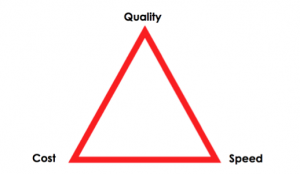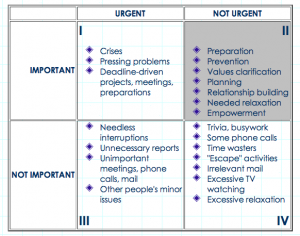by Charles Plant | Aug 13, 2013 | Leadership Development
 A friend of mine is pregnant (no, it’s not my fault,) and she told me last week that she is constantly being hounded by the Pregnancy Police. Don’t eat this. You shouldn’t be doing that. Are you getting enough sleep?
A friend of mine is pregnant (no, it’s not my fault,) and she told me last week that she is constantly being hounded by the Pregnancy Police. Don’t eat this. You shouldn’t be doing that. Are you getting enough sleep?
When she has the baby, she’ll be told a whole set of new things by the Baby Police as to how to raise the child.
This is a huge case of “Do as I say, don’t do as I do.” We’re very good at telling others what to do but seemingly poor at doing what we know we should be doing ourselves.
And yet we expect our leaders to be paragons of virtue. We expect them to behave impeccably at all times. We no longer tolerate leaders who say “Do as I say, don’t do as I do.”
Perhaps we need to cut people a bit of slack because if we expect perfection from our leaders, we’ll scare away imperfect candidates who might have something to contribute.
by Charles Plant | Aug 8, 2013 | Leadership Development
 My father tells a story about driving one evening many years ago to a meeting in another town. After driving for a while, he noticed his boss’ car behind him (No surprise as they were going to the same meeting.)
My father tells a story about driving one evening many years ago to a meeting in another town. After driving for a while, he noticed his boss’ car behind him (No surprise as they were going to the same meeting.)
After a short while, his boss passed him and zoomed ahead. When he arrived at the meeting my father asked why he had been in such a hurry. His boss replied that everything was fine until he realized that he was following my father and if he kept doing that, he would inevitably be late for the meeting.
After that exchange, my father resolved never to be late again.
Without trying to determine whether urgency is as a result of nature or nurture, I must admit that I too am obsessed by time. I can’t stand being late. I arrive wherever I’m going early, just so I can wait to be on time. (This makes me quite reliable but it is not a healthy obsession.)
At the same time, I’m not obsessed with quality or cost. These three dimensions, Quality, Cost, and Speed are the only strategic dimensions upon which a firm (or an individual) can differentiate itself from the competition.
What I’m trying to figure out today is whether this is true of everyone, whether each person can be rated on the Quality, Cost and Speed dimensions and we can say: “Yup, she’s a quality person.”
If this is true then we have a new dimension of behaviour upon which we can evaluate people. And even more, we have a new tool for matching the person to the job.
And I’ll go one step rather. If this QCS stuff is a behaviour or a trait then is it learnable? Can you take a Q person and make them an S person?
Think about it for yourself. What are you Q, C or S? And what does that mean to how you work? And can you learn to beef up the other dimensions?
by Charles Plant | Aug 7, 2013 | Leadership Development
I think I blundered into Stephen Covey’s Seven Habits when I created yesterday’s post on urgency. I wasn’t even thinking that way when I started and I think I have to go back to Covey again and see what I can get out of it that’s new.
But meanwhile, Covey’s problem was how to get stuff done when it is Important but Not Urgent. The following chart shows what he’s talking about.

How do you get something to become urgent? Well my current way of thinking is to make it part of a process with a deadline. Once you add a deadline to something, it becomes urgent.
If you are constantly examining your list of Important but Not Urgent projects (use a process to do this) then you can create process around these things with deadlines.
by Charles Plant | Aug 6, 2013 | Leadership Development
 I met a company recently that does a great job of creating a sense of urgency in their sales people. And they used a very simple trick.
I met a company recently that does a great job of creating a sense of urgency in their sales people. And they used a very simple trick.
But first to urgency itself. We all love to procrastinate and I’m among the worst. I’ll leave everything to the last minute if I can because I know that I’ll figure out how to spend less time working on something if I leave it till it’s almost too late.
So you can see this in companies all the time. If you look at the numbers underlying quarterly reports, you’ll find that salespeople will invariable produce most of their sales in the third month of the quarter and in fact, in the last week of that month.
So how do you get them to stop this habit? Well you create artificial deadlines. The company I met, who is incredibly successful in sales has weekly quotas for their salespeople.
With a weekly quota and compensation tied to that quota, people can’t slack off for more than a day or so. Unfortunately, with monthly quotas, people can slack off for a week or more and frequently have trouble making those quotas last minute.
Moving to weekly quotas was difficult in software terms because everything is done monthly in the software world and a month does not divide evenly into four weeks or always start on a Monday. To deal with this they went to the expense of having a custom system built that tracks sales and quotas and commissions on a weekly basis.
And it works like a charm.
by Charles Plant | Aug 1, 2013 | Leadership Development
 Referent Power sounds like one of those made up terms used by people who want to seem more intelligent. (Is it working so far?) But it is a real source of power in the workplace.
Referent Power sounds like one of those made up terms used by people who want to seem more intelligent. (Is it working so far?) But it is a real source of power in the workplace.
I worked many years ago with a young woman who went out of her way to make people feel welcome and comfortable in the office. She was perpetually cheery, jocular and friendly. She went out of her way to remember birthdays, celebrate successes and turn the office into a family like environment.
She had Referent Power. But we didn’t call it that back in those days. She had what we called Likeability. Everyone liked her.
And that Likeability moved mountains. She could get people to drop what they were doing and bend to her smallest need just in an attempt to please her. That’s the power of Likeability.
The great thing about Referent Power or Likeability is that no one minds it as a source of power (except for people who aren’t likeable.) People might reject Positional Power, dread Coercive Power, or fear Expert Power but they rarely reject Referent Power.
The moral of the story is exactly like your mother told you. If you can’t say anything nice, don’t say anything at all.
by Charles Plant | Jul 31, 2013 | Leadership Development
 Do you ever wonder why everyone is afraid of the people in finance and like the people in HR. Well it comes down to Coercive Power versus Reward Power.
Do you ever wonder why everyone is afraid of the people in finance and like the people in HR. Well it comes down to Coercive Power versus Reward Power.
Yup, HR has the ability to reward you. This can come in the way of job assignments, pay, benefits. Good things come from HR. Even if you get fired, that’s not HR’s fault, it’s your boss’.
But finance, that’s another case. They usually have Coercive Power. They don’t have any way of rewarding employees, just of coercing them into doing things the way they want done.
In the world of power politics at the office, these two powers tend to be situational. Other groups may have the ability to reward or coerce but these are the two main culprits. These powers are almost as good and sometimes even better than Positional Power.
After all, Finance can even go so far as to tell the CEO what to do in certain circumstances.
Unfortunately though, these types of powers can’t be added to out Power Politics game of Rock, Paper Scissors as they can’t be used very often and can only be deployed in certain circumstances.
 A friend of mine is pregnant (no, it’s not my fault,) and she told me last week that she is constantly being hounded by the Pregnancy Police. Don’t eat this. You shouldn’t be doing that. Are you getting enough sleep?
A friend of mine is pregnant (no, it’s not my fault,) and she told me last week that she is constantly being hounded by the Pregnancy Police. Don’t eat this. You shouldn’t be doing that. Are you getting enough sleep?




